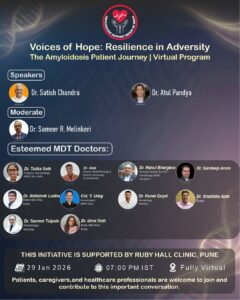Table of Contents
The Importance of Early Diagnosis in Amyloidosis
Introduction
Early diagnosis of amyloidosis is crucial for effective management and improved patient outcomes. This blog post will discuss the significance of recognizing symptoms and seeking timely medical attention.
Why Early Diagnosis Matters
Amyloidosis can lead to severe organ damage if left untreated. The earlier the diagnosis, the sooner treatment can begin, which can slow disease progression and improve quality of life. Delayed diagnosis may result in irreversible damage to vital organs.
Common Symptoms to Watch For
Recognizing the symptoms of amyloidosis is essential for early diagnosis. Common symptoms include:
● Fatigue: Persistent tiredness that does not improve with rest.
● Swelling: Noticeable swelling in the legs, ankles, or abdomen due to fluid retention.
● Numbness or Tingling: Peripheral neuropathy can cause these sensations, often in the hands and feet.
● Heart Palpitations: Irregular heartbeat or a feeling of fluttering in the chest.
● Kidney Dysfunction: Symptoms may include changes in urination patterns or swelling due to fluid retention.
Diagnostic Process
Diagnosis typically involves a combination of tests:
● Blood Tests: To check for abnormal proteins and assess organ function.
● Urine Tests: To detect light chains or proteinuria.
● Imaging Studies: Such as echocardiograms or MRIs to assess organinvolvement.
● Biopsy: A tissue sample from affected organs is examined for amyloid deposits using special staining techniques.
If you or someone you know is experiencing symptoms associated with amyloidosis, it is essential to seek medical advice promptly. Early diagnosis can make a significant difference in treatment outcomes and overall prognosis. Don’t hesitate to consult a healthcare professional if you have concerns about your health.
Support and Resources for the Amyloidosis Community
Living with amyloidosis can be challenging, but support and resources are available to help patients and their families navigate this condition. This blog post will highlight various support options and organizations dedicated to amyloidosis.
Support Groups and Communities
● Local Support Groups: Connecting with others facing similar challenges can provide emotional support and practical advice. Many hospitals and cancer centers offer support groups for patients with amyloidosis.
● Online Communities: Numerous online forums and social media groups provide a platform for sharing experiences, information, and encouragement. These communities can be invaluable for those seeking connection and understanding.
Organizations Offering Resources
● Amyloidosis Foundation: This organization provides educational materials, support resources, and advocacy for patients. They offer information on treatment options, clinical trials, and living with amyloidosis.
● International Society of Amyloidosis (ISA): The ISA offers information on research, treatment options, and support networks. They also host conferences and educational events to raise awareness about amyloidosis.
Importance of Multidisciplinary Care
A team of healthcare professionals, including hematologists, cardiologists, nephrologists, and specialty nurses, is essential for comprehensive management of amyloidosis. This multidisciplinary approach ensures that all aspects of the patient’s
health are addressed, leading to better outcomes.
Support and resources are vital for individuals living with amyloidosis. Engaging with support groups and organizations can provide valuable information and emotional support, helping patients navigate their journey with the disease. If you or a loved one is affected by amyloidosis, don’t hesitate to reach out for help and connect with
others in the community.

